Awareness of lymphedema is not very widespread among the general public. Mostly, one only deals with these disorders when becoming personally affected or if someone close to us is affected.
Before we go into detail about lymphedema, let’s talk about the lymphatic system and its role in the effective functioning of our body.
The Lymphatic System
Our body is made up of several complex systems such as the digestive system, respiratory system, and nervous system. One of these systems is the lymphatic system. Most people are unaware of how important this system is for us.
The lymphatic system, known as our body’s drainage system, forms an essential part of our immune system. Apart from protecting us against infections, the lymphatic system also transports fluid around the body and removes waste, such as: proteins, bacteria, and cell waste out of the interstitial spaces and into the vascular system.
The lymphatic system is made up of a network of lymph nodes, lymph vessels and lymph fluid. The lymph fluid is a colourless liquid containing white cells that cleanse our body and prevent infection. While the lymph flows in the body, the lymph nodes filter the substances that travel through our lymphatic system.
What is Lymphedema?
When these lymphatic nodes are damaged or blocked, the lymph fluid gets accumulated, which causes swelling in the tissues. This medical condition is known as Lymphedema.
Types of Lymphedema levels
There are mainly two types of lymphedema:
Primary Lymphedema: This is also known as congenital Lymphedema. It is rare and occurs in 1 in every 6000 people. It usually occurs at birth or in the early puberty stage.
Secondary Lymphedema: This is the more common type of lymphedema. It occurs as a result of damage to the lymphatic system due to some external factor or another disease such as cancer, parasites, or bacterial infection.
Symptoms of Lymphedema
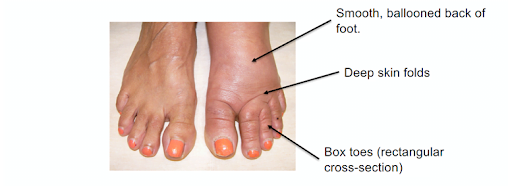
Lymphedema symptoms include:
- Swelling in your affected limb that is asymmetrical
- Balloon-like swelling in the dorsum of the foot or back of hand
- Visible depression in the skin when pressure is applied to the swelling
- Square toes
- Hardening or thickening of skin in the advanced stages
- Pain, discomfort and heaviness in the affected limb
- Deepened, natural skin folds, especially on the base joints
- Positive ‘stemmer sign’
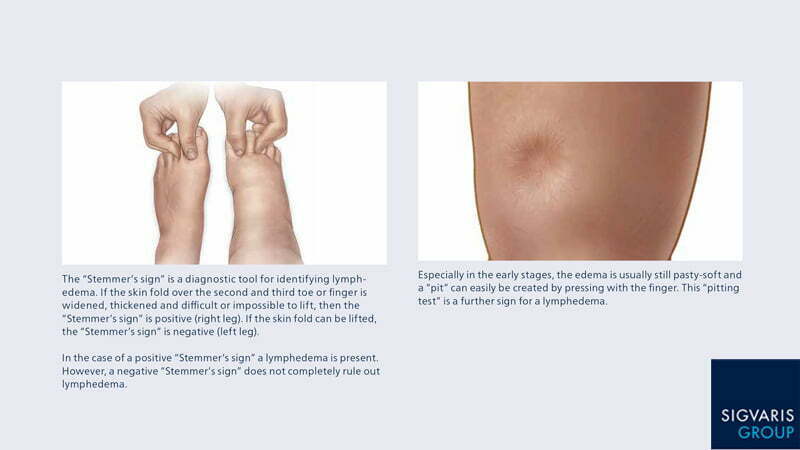
The 4 Stages of Lymphedema
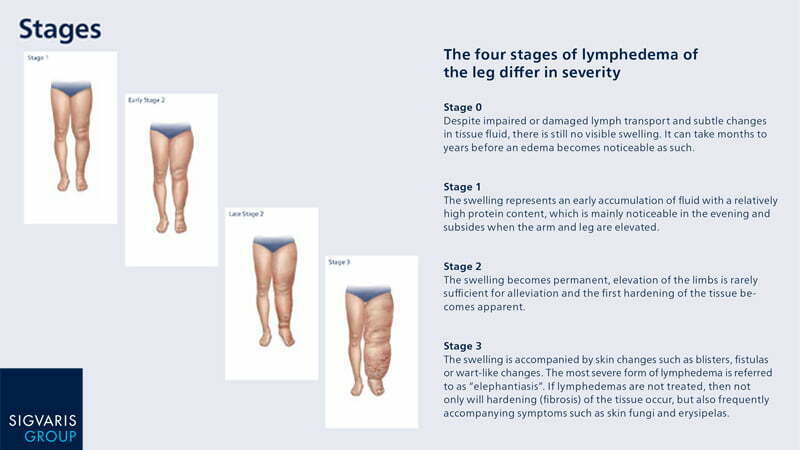
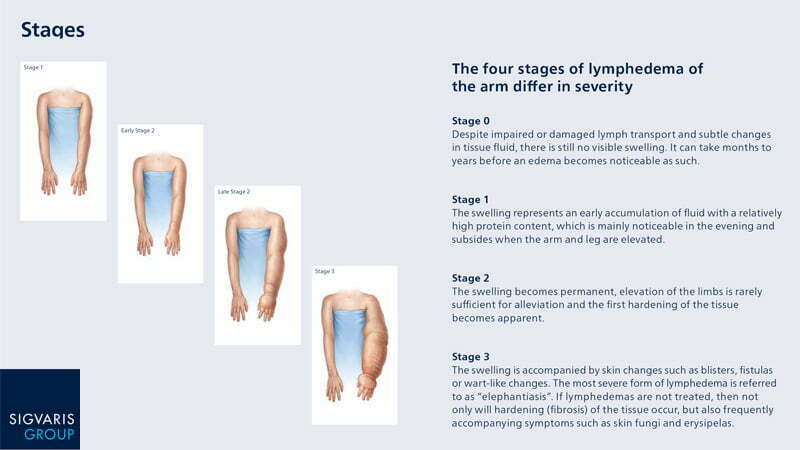
When to see a doctor?
When you see unusual and persistent swelling in your arms and legs for some time, you should immediately visit your doctor.
If you are diagnosed with Lymphedema already, and you see a dramatic increase in the affected arm or leg size, you need to take medical advice as soon as possible.
Lymphedema Causes
Cancer: Cancer might spread through the lymphatic system; therefore, while operating cancer, surgeons remove the lymph nodes, which affects the lymphatic system resulting in lymphedema. Also, sometimes the cancerous tumour gets bigger and blocks the lymphatic vessels.
After-effects of radiation therapy (cancer treatment): Radiation therapy to destroy cancer might also affect the lymphatic system, leading to lymphedema.
Infections or injuries: Various cellular conditions might damage the lymph nodes and the lymph vessels, leading to irregular lymph flow. Also, some parasite infections may lead to an increase in the risk of Lymphedema. The swelling in the lymph nodes also happens due to bacterial or viral infections.
Skin burns or severe injuries can also be one of the major Lymphedema causes.
Cardiovascular disease: These diseases affect the blood circulation in the body. Some people having venous leg ulcers, varicose veins and deep veins thrombosis (DVT) are more prone to the condition.
Complications
If treatment and management of lymphedema is neglected or proper care is not taken, there may be complications such as:
- Increase in volume of the limb to an extent that could restrict freedom of movement.
- Hardening or deformation of skin tissue which may resemble elephant’s skin
- Chronic wounds or other serious infections
- Muscular pain due to heaviness of limb
Lymphedema Treatment and Cure
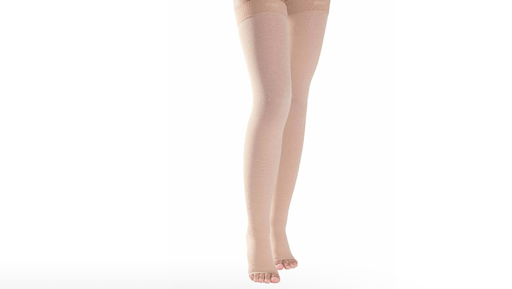
- Lymphedema Exercise: Try moving your arm or leg so that the clogged fluids can drain quickly. The swelling might decrease if there’s movement in the affected body area.
- Bandaging: Compression bandaging is a standard treatment method to decongest or reduce the size of the limb.
- Use Compression Stockings or Compression Wraps: This is one of the best ways to maintain the results achieved via bandaging and avoid worsening of the edema. Compression Stockings provide graduated compression to promote lymph flow through the limb.
- We recommend you use Novomed Shop’s Sigvaris compression stockings or adjustable wraps to support your affected arm or leg needs.
- Massage therapy: Manual lymph drainage is a massage technique that promotes lymph flow and reduces swelling. The technique concentrates on draining the accumulated fluid in the lymph vessels. Manual lymph drainage massage is different from regular massage.
- Pneumatic pump: Pneumatic pump is also known as intermittent pneumatic compression. This machine has inflatable sleeves or garments that are attached to the device. The machine has multiple spaces like balloons that inflate one after the other to promote a smooth flow of the lymph fluids.
- Surgery: If the Lymphedema condition is severe, the doctor might recommend surgery.
FAQ’s
Q1. Does Lymphedema have a permanent cure?
Ans. Unfortunately, lymphedema cannot be cured. However, symptoms can be managed to improve the quality of life. For example, you can use compression stockings to ensure a smooth flow of lymph throughout your body.
Q2. Can we drain the lymphedema fluid?
Ans. A manual lymph drainage is a form of massage that can help move the accumulated fluid to the lymph nodes, where it can be drained.
Q3. Can I drain my lymphatic system at home? Can I drain my lymphatic system at home?
Ans. We suggest you take medical advice before trying any exercise or other methods to drain the lymph fluids.


Comments
There are no comments yet.